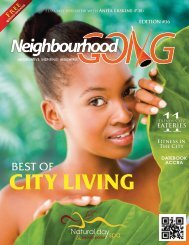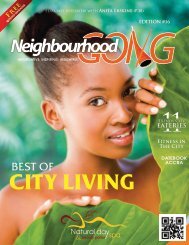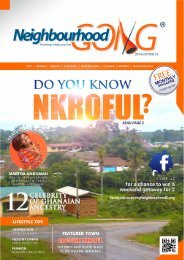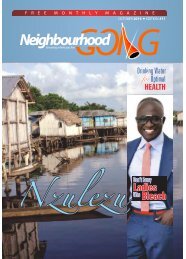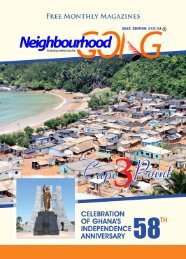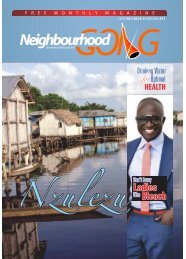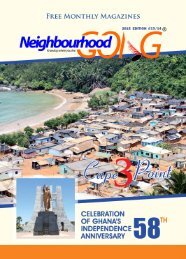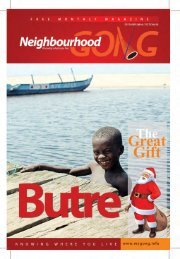Edition 9
You also want an ePaper? Increase the reach of your titles
YUMPU automatically turns print PDFs into web optimized ePapers that Google loves.
WHERE DO YOU LIVE?<br />
10<br />
WWW.NBGONG.NET<br />
The remains of an ancient defence wall<br />
are in Nalerigu, in the East Mamprusi<br />
District. What is interesting about this<br />
defence wall, which dates back to the<br />
15thC, is not only that it was built by a<br />
powerful Mamprusi Chief, but that the<br />
wall was built with mortar of mud blood<br />
and honey.<br />
Salaga, where the wells that provided<br />
water for bathing slaves for sale, still<br />
stand together with the residences of<br />
slave merchants, is a vivid reminder of<br />
this barbaric trade in human beings.<br />
The mythical stone, which compelled<br />
the construction of a road to be diverted<br />
because it could not be removed, is still<br />
at Larabanga while a mystery tree with<br />
the mark of horse hooves turned up and<br />
down is in the Jaagbo grove, near<br />
Tawak. Another mystery tree is in the<br />
Regional Hospital ground in Tamale.<br />
The most important traditional<br />
festival in the region is the Damba,<br />
a relic of Islam, which has lost its religious<br />
origin of the celebration of the birthday of<br />
Prophet Mohammed. The Damba<br />
celebration is also a mix of music, dance,<br />
excitement, horsemanship and regal<br />
pageantry, at the climax of Naa Damba.<br />
.<br />
Larabanga Mystery Stone<br />
Why not try your hands on the Traditional<br />
textile weaving in the North “Fugu”. It is<br />
quiet a heavy traditional wear. The main<br />
centers for its production are Yendi,<br />
Gushegu and Tamale. In Doboya the only<br />
Slave hole<br />
economic activity is the “Fugu”. A visit<br />
there would include a boat ride, fishing,<br />
the chance to see salt mining, and a<br />
bird sanctuary. Jakarayili and Kikuo in<br />
Tamale are villages where giant pots<br />
are made. The Lobi's in Bole District<br />
produce exotic water pots and baskets.<br />
Leather is produced in a traditional<br />
tannery in Zongoni Tamale for all kinds<br />
of leather by craftsmen around the<br />
town. A visit to the central market in<br />
Tamale will not be a bad idea at all, you<br />
Xylophone<br />
get everything Northern there. The<br />
Northern region is endowed with,<br />
Hotels, schools, clinics, good roads,<br />
electricity. Some of the hotels have<br />
state of the art facilities, besides their<br />
local delicacies are the familiar dishes<br />
you may be used to. It may be your first<br />
time of visiting the Northern Region<br />
w h i c h w i l l m e a n c h a n g e o f<br />
environment; it is advisable not to<br />
travel with heavy clothing, lighter ones<br />
will do, generally the place is very warm<br />
and please do not forget your<br />
repellants. Although the Northern<br />
Region may not be as popular among<br />
Masquerade<br />
tourists visiting Ghana, it should not be<br />
overlooked when wanting to<br />
experience everything Ghana has to<br />
offer<br />
. To get to the North there are several<br />
STC and private buses that connect<br />
Tamale to Accra and Kumasi on a daily<br />
basis except Sundays either through<br />
the Techiman and Kintampo route or<br />
the road connecting Kumasi to Wa via<br />
Wenchi and Bole.




